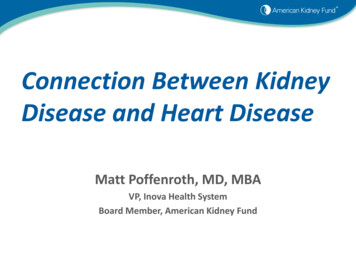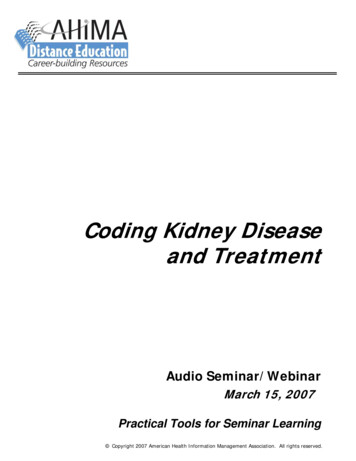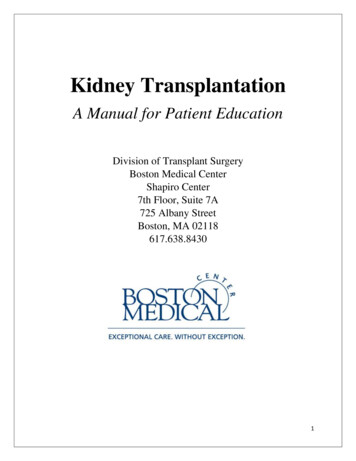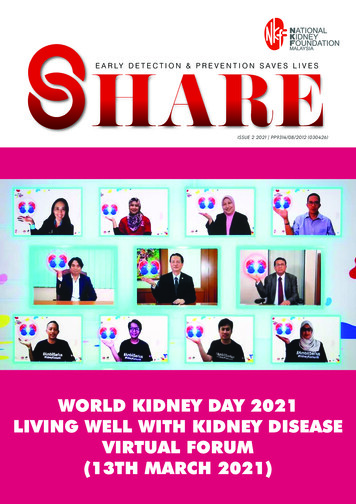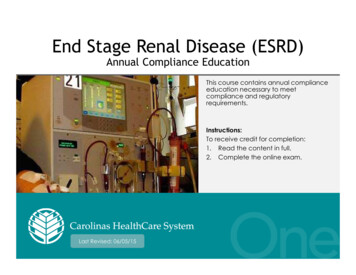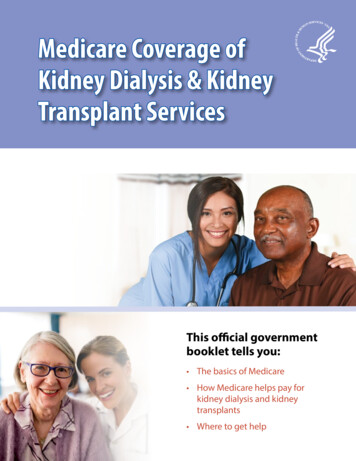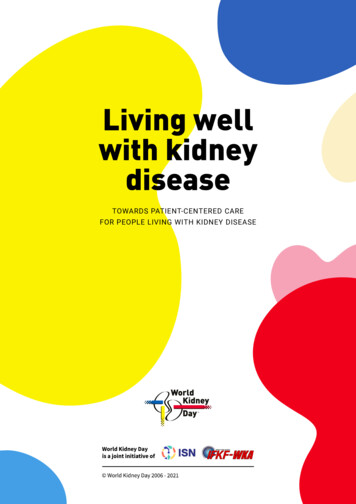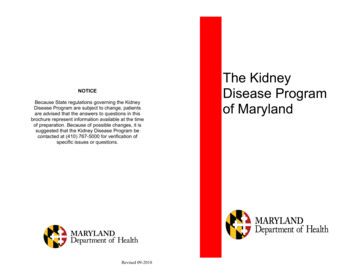
Transcription
NOTICEBecause State regulations governing the KidneyDisease Program are subject to change, patientsare advised that the answers to questions in thisbrochure represent information available at the timeof preparation. Because of possible changes, it issuggested that the Kidney Disease Program becontacted at (410) 767-5000 for verification ofspecific issues or questions.Revised 09-2018The KidneyDisease Programof Maryland
THE BROCHUREThis brochure provides answers to commonly askedquestions about the Kidney Disease Program of Maryland andreflects State regulations, COMAR 10.20.01, governing theProgram at the time of publication. If you require additionalinformation, please contact the Kidney Disease Program at theaddress and /or telephone number located on the last page ofthis brochure.INTRODUCTIONThe Kidney Disease Program, under the MarylandDepartment of Health, was created by the 1971 GeneralAssembly and became law on July 1, 1971. The same lawcreated the Maryland Commission on Kidney Disease. A newbill, signed into law May 1991, split the regulatory powers bywhich the Kidney Disease Program is governed.Under the new law, the Maryland Commission on KidneyDisease is responsible for developing reasonable medicalstandards for hospital and freestanding dialysis facilities as wellas transplantation centers located within Maryland. TheCommission also defines the medical criteria by which anapplicant may seek certification with the Kidney DiseaseProgram.The Maryland Department of Health is responsible for thedevelopment of regulations, which are associated with the fiscaladministration of the Kidney Disease Program. Thoseregulations govern non-medical eligibility criteria and recoveryand reimbursement.The development of this Program expresses the continuingconcern of the State of Maryland for its citizens with end-stagerenal disease. This stage of renal impairment is almost alwaysirreversible and requires dialysis and/or kidney transplantation inorder to maintain life. The State recognizes its responsibility tohelp reduce the financial hardships that accompany this diseasewhere these expenses are partially or wholly unmet by eitherFederal or private sources.WHO IS ELIGIBLE?To be eligible for certification by the Kidney Disease Programan applicant must:1.be certified by a physician as having chronic end-stagerenal disease; and110
However, the patient dialyzes continuously 24hours per day, 7 days per week withoutinterruption. The CAPD patient usually does fourexchanges per day. These exchanges are nottime consuming, but do require being done understerile conditions.B.C.Continuous Cycling Peritoneal Dialysis (CCPD)A variation of CAPD, CCPD uses the cyclermachine to produce and cycle the dialysis fluid.The CCPD patient usually dialyzes 6 times perweek.Intermittent Peritoneal Dialysis (IPD)- The IPDpatient dialyzes using a cycler machine in three12 hour sessions per week or four 9 hoursessions per week. IPD is seldom utilizedbecause CAPD and CCPD have proven to be themore efficient methods of peritoneal dialysis.2. be a citizen of the United States who is a permanent residentof Maryland, or an alien lawfully admitted for permanentresidence in Maryland. Five-year ban to program benefits forqualified aliens applies. Proof of residency is required, and3. be on home dialysis under the auspices of a certified hospitalor certified freestanding dialysis facility or receiving treatmentin a certified dialysis facility and /or transplantation center inMaryland; or4. have begun a course of maintenance renal dialysis in an outof- state facility when the Program has preauthorized thetreatment based on the facility’s proximity to the applicantsprimary residence or to assure continuity of care, or both; and5. submit a completed application and all requireddocumentation to the Kidney Disease Program.6. Financial status is not a criterion for eligibility, but may have abearing on the amount of financial responsibility which maybe borne by the individual in the form of an annual Programparticipation fee.7. Transplant Centers may require ESRD patients to be certifiedwith KDP before being placed on a kidney transplant wait list.If you have any questions not answered in this brochure,please contact:Kidney Disease Program of Maryland201 West Preston Street, Room SS-3Baltimore, Maryland 21201(410) 767– 5000or visit the Website /Pages/kidneydisease.aspx9WHEN AND HOW TO APPLYA patient is eligible to request financial assistance from theKidney Disease Program when he/she begins chronicmaintenance dialysis in a certified hospital or certifiedfreestanding dialysis facility, or receives a renal transplant in acertified transplantation center.Annual recertification is required in order to maintaincontinuity of Kidney Disease Program coverage.All certified hospitals, freestanding dialysis facilities, andtransplantation centers in Maryland have the Kidney DiseaseProgram Application for Certification forms. Renal social workersor other designated facility personnel may assist the patient in thecompletion and submission of a completed application and allrequired documentation to the Kidney Disease Program.2
A completed signed, and dated application and all requireddocumentation, i.e., Federal Income Tax returns, healthinsurance information, etc. must be received by the KidneyDisease Program in order for the Program to process theapplication. Incomplete applications will be returned to theapplicant, possibly resulting in delays in certification.How can a decision made by the Maryland Commission onKidney Disease be appealed?A written request for review of a decision made by theMaryland Commission on Kidney Disease should be sent to:The Executive DirectorMaryland Commission on Kidney Disease4201 Patterson AvenueBaltimore, Maryland 21215Complete applications and all required documentation shouldbe submitted to the following address:Kidney Disease Program of Maryland201 West Preston Street, Room SS-3Baltimore, Maryland 21201What types of financial assistance and coverage areavailable?The Kidney Disease Program is a payer of last resort. Thismeans the Program may provide financial assistance to certifiedMaryland end-stage renal disease patients according to thefollowing criteria only after all other Federal, State and privatemedical insurance coverage has been pursued.Coverage for care and treatment received in any Marylandhospital, certified freestanding dialysis facility, or certifiedtransplantation center when such care and treatment is requiredas a direct result of the patient’s end-stage renal disease.Coverage of routine chronic maintenance dialysis in a hospitalsetting is restricted to those Maryland hospitals, which have beencertified by the Maryland Commission on Kidney Disease.EXPLANATION OF DIALYSIS MODALITIES1. Hemodialysis– dialysis via a surgically created access, usuallyin the arm, 2-3 times per week for a total of 9-12 hours per week.A.In-center Hemodialysis– Hemodialysis procedurecarried out in a hospital dialysis unit or a freestanding dialysis unit by professional medicalstaff.B.Self-care Hemodialysis– Hemodialysis performedin a hospital dialysis unit or a freestanding dialysisunit with the patient himself doing much, if not all,of the dialysis procedure under the supervision ofprofessional medical staff.C.Home Hemodialysis– Hemodialysis proceduredone in the patient’s home by the patient and adialysis partner, usually the patient's spouse,parent, or adult child. Home hemodialysis is doneunder the auspices of a home training unit. Thereis no professional medical staff present in thepatient's home, but a doctor and home dialysisnurse are on call should the patient requireassistance.Coverage for the first three months of a patient’s end-stage renaldisease care and treatment beginning with the first chronicmaintenance dialysis prior to Medicare eligibility.Payment of Medicare deductible and co-insurance.Coverage of approved physician services at the approved rates.Coverage of prescription drugs on the Kidney Disease ProgramReimbursable Drug List when prescribed by a physician in thetreatment of end-stage renal disease. (Patients with prescription2. Peritoneal Dialysis– dialysis via a surgically implanted catheterplaced in the abdomen, Peritoneal dialysis requires a minimum of36 hours of dialysis per week. All forms of peritoneal dialysis maybe done in-center or in the home.A.3Continuous Ambulatory Peritoneal Dialysis(CAPD)- CAPD involves no cycler machine.8
a change in address;a change in State residence, citizenship, or alien status; orthe patient regarding renal function (does not includeindividuals who have regained kidney function because ofrenal transplantation).3. Transfer to an out-of-state dialysis facility withoutpreauthorization from the Kidney Disease Program;4.No longer meets the medical requirements for certification;5. No longer meets the residence, citizenship, or alien statusregulatory requirements6. Fails to pay the annual Program participation fee (if such afee has been assessed);7. Fails to apply for and maintain enrollment in Medicare Part A,Part B, and Part D if eligible;8. Fails to apply for and maintain enrollment in the MedicalAssistance Program if required by the Program;9. Fails to pay the Program any monies received from anysource for payment of end-stage renal disease treatmentcosts previously reimbursed by the Kidney Disease Program;10. Is incarcerated by a Federal, State, or local penal orcorrectional system; or11. Has diedHow can a decision made by Kidney Disease Program beappealed?A written request for review of a decision made by the KidneyDisease Program of Maryland should be sent to:Kidney Disease Program of Maryland201 West Preston Street, Room SS-3Baltimore, Maryland 212017coverage through Medicare Part D, private health insurance orMaryland Medical Assistance must present their Medicare PartD, insurance prescription, or medical assistance card along withtheir Kidney Disease Program card whenever they have aprescription filled. The Kidney Disease Program will pay theco-pay for prescriptions filled with the previously mentionedcards.)Post renal transplant coverage of certain immunosuppressantdrugs is consistent with Medicare policy.Coverage of approved equipment, supplies, and servicesrequired by certified patients dialyzing independently at homeunder the auspices of a certified hospital or certifiedfreestanding dialysis facility.The Kidney Disease Program may preauthorize coverage ofcertain special services or expenses when such services/expenses are required as direct result of the patient’s end-stagerenal disease. Preauthorization for coverage must be requestedin writing by the patient's nephrologist detailing the specific needfor the services/expenses being requested and the correlation tothe patient’s end-stage renal disease.Questions concerning specific services should be directed to theKidney Disease Program.Does a patient have to pay to be certified by the KidneyDisease Program?Based upon financial information provided by a patient at thetime of certification/recertification, the Kidney Disease Programmay assess an annual Program participation fee. If a fee hasbeen assessed, the patient will be billed. The invoice will reflectthe total annual Program participation fee. The patient will havethe option of paying the entire amount due or making equalquarterly payments by specified payment dates. Failure to payan assessed program participation fee in a timely manner willresult in termination from the program. Specific instructionsaccompany the program participation fee invoice and must befollowed to avoid payment penalties.Insurance payments which a patient receives for servicespaid by the Kidney Disease Program on the patient’s behalfmust be endorsed and forwarded to the Program.4
What if a patient does not want to pay the assessedannual program participation fee?renal transplantation or give reasons why such counseling wasnot provided.If a patient is assessed a program participation fee anddoes not want to pay the fee, the patient may withdraw fromKDP. An area is provided at the bottom of the invoice for thepatient to check the box, sign, date, and return the entire formto the Kidney Disease Program within 30 days of the billingdate. Failure to return the signed invoice and/or use the KDPcard to receive benefits may result in the patient being heldresponsible for the participation fee.It is the policy of the Maryland Commission on Kidney Diseasethat inpatient treatment outside of Maryland hospitals will not bepaid. Exception to this policy can only be granted for inpatientrenal transplantation care and only with written preauthorizationby the Maryland Commission on Kidney Disease.Reimbursement for out-of-state transplantation services is limitedto the actual transplant and does not include follow-up care. Outof-state outpatient labs and bloodwork can be reimbursed byKDP.How may a patient withdraw from the Kidney DiseaseProgram?What about vacations and travel?If a patient chooses to withdraw from the Kidney DiseaseProgram at any time during his/her certification period, thepatient must notify the Program in writing of his/her decision towithdraw. The Program may not refund any participation feepaid when the recipient’s Program enrollment is terminatedunless the termination occurs before the start of the quarter forwhich the Program participation fee was paid and the KDPcard is not used to receive benefits.What if a patient seeks dialysis/transplantation outside ofMaryland?If, for geographical reasons or documented continuity ofcare, a certified end-stage renal disease patient residing inMaryland seeks outpatient dialysis outside the State ofMaryland, the Kidney Disease Program may preauthorize theout-of-state coverage. Any individual seeking financialassistance for services rendered outside the State of Marylandmust have his/her nephrologist write a letter to the KidneyDisease Program requesting approval for financial assistanceoutside the state. The letter should detail the specific reasonswhich support the request and document that the out-of-stateprovider agrees to the rates paid by the Kidney DiseaseProgram.In addition, the nephrologist must indicate whether theapplicant has been counseled in alternative methods oftreatment such as home hemodialysis, home intermittentperitoneal dialysis, Continuous Ambulatory Peritoneal Dialysis(CAPD), Continuous Cycling Peritoneal Dialysis (CCPD), or5Dialysis does not preclude the possibilities of travel orvacations for end-stage renal disease patients. Written requestsfor Kidney Disease Program coverage of out-of-state dialysisduring travel or vacations must be received by the Program atleast two (2) weeks prior to the travel date. After the Programreceives written notification of your intent to travel out-of-state, itwill the forward information to the transient dialysis facilityinforming the facility of the Kidney Disease Program’sreimbursement policies in accordance with Maryland rates.Patients should be aware that out-of-state dialysis facilities arenot obligated to accept the Kidney Disease Program’s offer ofreimbursement and may instead require up front payment by thepatient. In such cases, the Kidney Disease Program cannotreimburse the patient for those charges.When may patient enrollment be terminated?The Kidney Disease Program shall terminate a patient’senrollment in the Program before expiration of the currentcertification period if the patient:1. Voluntarily disenrolls;2. Fails to provide the Program with notification within 30working days of:a payment received from any source that is related totreatment of the patient’s end-stage renal disease;6
Disease Program of Maryland should be sent to: Kidney Disease Program of Maryland 201 West Preston Street, Room SS-3 Baltimore, Maryland 21201 7 coverage through Medicare Part D, private health insurance or Maryland Medical Assistance must present their Medicare Part D, insurance prescription, or medical assistance card along with


